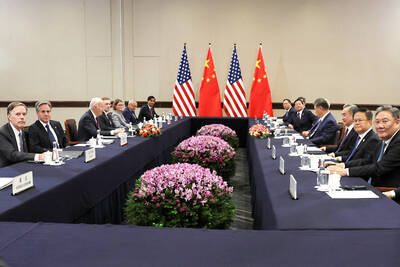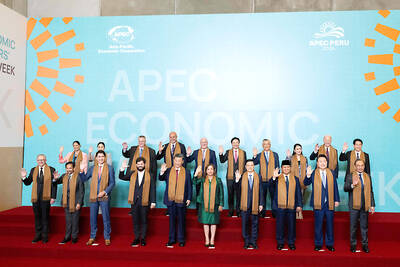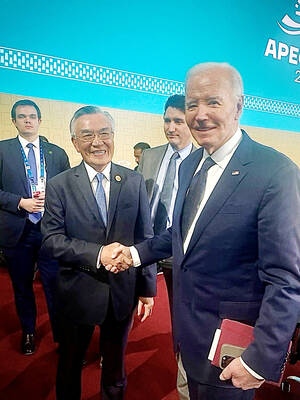Breeders’ rights have been officially granted for Pinpu black swine and Yuansing cattle, marking a milestone in non-governmental breeding in Taiwan, the Ministry of Agriculture’s (MOA) Taiwan Livestock Research Institute said yesterday.
Pinpu black swine and Yuansing cattle were developed through participatory breeding, in which professional breeding knowledge and techniques were provided by the public sector for industry operators to breed livestock and poultry, institute Director-General Huang Jeng-fang (黃振芳) said.
Participatory breeding is a great example of public-private partnership, he said, adding that breeding stocks are crucial to ensuring consistent quality.

Photo courtesy of GGP Biotechnology Co
The Pinpu black pig was first bred by Pin-pu Farm Corp (春發成畜牧場) founder Lee Jung-chun (李榮春) in 2008.
Taiwanese black pigs had lost their original flavor due to generations of hybridization, but he found breeding stocks with stable quality through multiple genetic screenings, Lee said.
Pinpu black swine are four times sweeter than Iberian pigs and have 1.5 times more collagen, making their meat competitive enough to be exported to Hong Kong and the Philippines, he said.

Photo courtesy of Pin-pu Farm Corp
Institute Technical Services Division chief Yang Chen-jung (楊振榮) said that breeding stocks of Yuansing cattle are descendants of work cattle introduced from Japan during the colonial period.
The work cattle have distinctive genetic characteristics as they have been stocked in Yangmingshan (陽明山) since the Japanese government retreated and have not hybridized with other strains, he said.
In 2016, former president Lee Teng-hui (李登輝) purchased all of the work cattle — including eight bulls and 11 cows — in a project to produce Japanese-style beef using cattle in Hualien County, Yang said.
Lee Teng-hui invited Japanese experts to examine the cattle and found that Yuansing cattle are genetically closer to wagyu — Japanese breeds of beef cattle — than cattle from the West, he added.
GGP Biotechnology Co (源興居生技) chairman Liu Tai-ying (劉泰英) said he had not known of Lee Teng-hui’s plan to breed the Japanese cattle until Lee asked him to invest in his breeding plan.
“I did not dare to stop him and would just do whatever he asked me to do,” he said.
Liu said he is a financial expert and did not know how to breed beef cattle, despite being born and raised in a farming family.
Liu took over the project when Lee Teng-hui, who had been diagnosed with cancer, entrusted it to him.
Liu continued to raise capital to increase his investments, which added up to NT$300 million (US$9.34 million), he said.
While more than 90 percent of domestic beef is imported, the fresh meat market looks like a promising market for Yuansing cattle, Liu said, adding that he aims to first increase the number of the cattle to meet market demand.
GGP Biotechnology general manager Chung Ti-ming (鍾迪名) said the company has commissioned small local farms to breed Yuansing cattle for consumption.
The goal is to breed 1,000 cattle within three years, with a long-term goal of 10,000 cattle, he said, adding that a Vietnamese firm with hundreds of hectares of farmland has expressed interest in the project.

ONE LAST TALK: While Xi said that Taiwan was a ‘red line,’ Biden, in what is likely his last meeting with Xi as president, called for an end to China’s military activity around Taiwan China’s military intimidation and economic coercion against Taiwan are the main causes of tensions that are destabilizing peace in the Taiwan Strait, Taipei said yesterday while thanking US President Joe Biden for expressing Washington’s firm stance of maintaining peace and stability in the region. Biden and Chinese President Xi Jinping (習近平) met on Saturday for their third meeting and their first talks in seven months on the sidelines of the APEC forum in Lima, Peru. It was likely Biden’s last meeting as president with Xi. During their conversation, Biden reiterated the US’ opposition to any unilateral change to the “status quo” from either

Taiwan would participate in the 2026 APEC summit to be hosted by China after Beijing promised it would ensure the personal safety of attendees, Taiwanese national security sources said yesterday. The APEC Leaders’ Machu Picchu Declaration announced yesterday said that China would host the APEC summit in 2026. Beijing proposed hosting the summit shortly before this year’s gathering began on Friday, a national security official said, speaking on condition of anonymity. Many APEC members expressed concerns about China hosting the event and said that prior communication over the decision was insufficient, the official said. Taiwan brought up concerns about legal “guidelines” China announced in

SUPPORT: Arms sales to NATO Plus countries such as Japan, South Korea and Israel only have to be approved by the US Congress if they exceed US$25m The US should amend a law to add Taiwan to the list of “NATO Plus” allies and streamline future arms sales, a US commission said on Tuesday in its annual report to the US Congress. The recommendation was made in the annual report by the US-China Economic and Security Review Commission (USCC), which contained chapters on US-China economic and trade ties, security relations, and Taiwan and Hong Kong. In the chapter on Taiwan, the commission urged the US Congress to “amend the Arms Export Control Act of 1976 to include Taiwan on the list of ‘NATO Plus’ recipients,” referring to

MEET AND GREET: The White House, which called the interaction ‘just a handshake,’ did not immediately respond to a request for comment on whether Biden planned to visit Taiwan’s envoy to the APEC summit, Lin Hsin-i (林信義), on Friday invited US President Joe Biden to visit Taiwan. During the APEC Leaders’ Informal Dialogue, Lin, who represented President William Lai (賴清德) at the summit, spoke with Biden and expressed gratitude to the outgoing US president for his contribution to improving bilateral ties between Taipei and Washington over the past four years, the Ministry of Foreign Affairs said. Lin and Biden exchanged views during the conversation, with Lin extending an invitation to Biden to visit Taiwan, it said. Biden is to step down in January next year, when US president-elect Donald Trump is